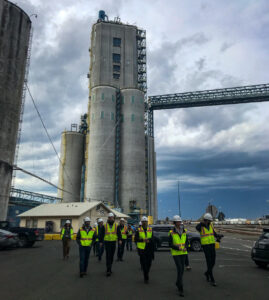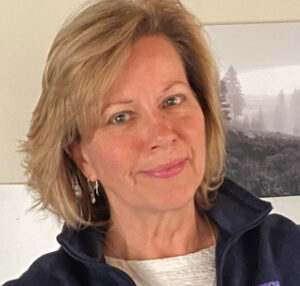The Agriculture and Forestry Education Foundation trains leaders to advocate for policies that support natural resources industries in Washington State. In this interview, interim Executive Director Vicky Scharlau speaks with Irrigation Leader about how the organization’s intensive 18‑month AgForestry Leadership Program transforms participants, who hail from a wide range of agriculture, forestry, and fisheries jobs, into savvy spokespeople for those sectors.
Irrigation Leader: Please tell us about your background and how you came to be in your current position.
Vicky Scharlau: I was raised on a farm, and my professional life has played out in the agriculture and natural resources arena, which means I know the industries AgForestry serves. I also have 40 years of experience managing nonprofit organizations. Finally, I’m a graduate of the program as well. I believe that trifecta assured AgForestry’s board and its donors that choosing me as the interim executive director would be a positive step.
Irrigation Leader: Would you tell us about the history of the AgForestry program?
Vicky Scharlau: The Agriculture and Forestry Education Foundation, which over the years has become known as AgForestry, was established in 1977 to cultivate leaders to advocate for management and public policy that supports Washington State’s natural resources industries and the surrounding communities. At the time, the so-called fish wars had launched a great public debate over fisheries and forestry in the state. Those battles took place not just in courtrooms but in the state’s forests and rivers. It was the era when the Timber-Fish-Wildlife (TFW) Agreement was formed, thanks to two strong leaders on opposing sides: Billy Frank Jr., a Nisqually tribal leader, and Stu Bledsoe, an Ellensburg rancher-turned-politician. What Stu and Billy were able to accomplish with the TFW Agreement allowed all natural resources industries, including agriculture, to see the need for and the value of aggressively pursuing their needs and explaining them to the public, especially in public policy. The AgForestry founders understood that the challenges they faced would not be solved in their generation. They wanted to create a program that endured and that would continue to develop leaders to advocate for natural resources industries. Now in its 43rd year, the program has been very successful.
Irrigation Leader: Would you tell us more about the AgForestry Leadership Program?

Vicky Scharlau: The leadership program brings together natural resources managers and stakeholders from both the public and private sectors. For each leadership class, we select up to 24 candidates from statewide applicants. Participants come from a range of professions in agriculture, forestry, and fishing and include producers, processors, shippers, marketing professionals, and salespeople. The idea is to broaden their knowledge and refine the skills that are needed to provide leadership in a constantly changing environment.
The 18‑month program provides hands-on learning experiences. Over the course of 11 in-state seminars, participants gain a broader understanding of various stakeholders in Washington State, an appreciation for the interdependencies among industries, and a deeper sense of self and service. The seminars cover a broad range of skills and topics, including communication, public speaking, working with the media, forestry and agriculture issues, the Columbia River system, social issues, state government, crime and corrections, and transportation. Participants hear from over 250 subject-matter experts and leaders in their fields, helping them gain the confidence and know-how to promote effective and inclusive public policy for our state.
In addition, each participant works on a public policy project for the entire 18 months of the program. In many instances, these projects become actual state law or are written into the Washington Administrative Code. These projects make a difference. The program makes public policy real for participants, whether it’s through involvement with the city council, the county commission, or the school board.
Irrigation Leader: Can you provide a recent example of an advocacy or public policy campaign that your graduates have worked on?
Vicky Scharlau: Some recent projects have focused on improving mental health opportunities in the agricultural community, expanding broadband access in Washington State, expanding the workforce for the wine industry by allowing 18- to 20‑year-olds to work in production, and securing funding for search-and-rescue organizations.
The workforce development project addressed recently passed legislation allowing 18‑ to 20‑year-olds enrolled in community college enology and viticulture programs to taste wine at school and to work in internships. However, once they graduate, they are not able to work in wine production until they turn 21. This excluded the same qualified graduates from the workforce, decreasing their earning ability, reducing labor availability for employers, and creating another barrier to development for small communities and the entire Washington wine industry. The project goal was to amend the Revised Code of Washington 66.44.318 to explicitly allow 18‑ to 20‑year-olds to work in wine production in Washington State under the supervision of an employee of at least 21 years of age. The group successfully got a bill written, sponsored, passed through both chambers of the legislature, and passed into law after two separate legislative sessions of attempting to do so. There are plans to expand the bill in 2022 to include brewers and distillers.
Irrigation Leader: What country is this year’s class going to?
Vicky Scharlau: There are two classes always operating at the same time. Class 43 will go to Washington, DC, this year, and Class 42 will go to Puerto Rico. Puerto Rico provides a unique learning opportunity to see the infrastructure damage caused by the storms that hit the island. The international trip is designed to increase awareness and understanding of trends and emerging issues in other countries and to provide opportunities to explore a different political system, to discover the country’s culture and history, to learn about its agricultural production systems and natural resources management approaches, and to take participants out of their comfort zones. Puerto Rico provides a unique opportunity to explore what will feel like and in many ways be like a different country without leaving U.S. borders. The class will see fruit and vegetable production and forest management practices and be able to compare and contrast the public policy of a territory with that of a state
Irrigation Leader: How long will you serve as interim head of the program?
Vicky Scharlau: I started in August 2021; the end date may depend on the completion of a strategic plan that the board is working on right now. That plan, once it is completed and approved by the board of directors, will identify the future needs of the organization and the skills the board is looking for in a new executive director.
Irrigation Leader: Please tell us what you know so far about what the leadership is looking for in a new executive director.
Vicky Scharlau: The first important skill for the executive director of a large, involved nonprofit like AgForestry is to have experience running a nonprofit organization. The leader also needs to be able to work effectively and efficiently, guide a board, and execute a strategic plan and the annual work plans that come from it. They must be able to move the needle on an organization that’s building leaders for tomorrow.

Irrigation Leader: Going forward, will the program format and activities change?
Vicky Scharlau: The answer to that is complicated. One of the many reasons the board chose to undergo a strategic planning process was to answer that question. It realized that our natural resources industry is changing and that the next generation of leaders needs to learn and adapt to leadership challenges differently than we did 40 years ago. We have a program that originally targeted Baby Boomers. Now, we’re starting to train the Millennials, but as we look to the future, we’re looking at training leaders from Gen Z. Gen Z people get information differently, they interact differently, and the organizations and industries that they’re involved in are different. Therefore, we need to have a program that can pivot to attract future leaders. It can’t be the model of yesterday; it has to be a model for tomorrow.
Irrigation Leader: What have you enjoyed the most about being the interim director?
Vicky Scharlau: It has been a great experience, and I’m thankful that I’ve had this opportunity. It’s more than just a job—it’s truly been a passion for me. The staff at AgForestry are so committed, so bright, and so engaged. They really understand that providing this program to the natural resources industries of Washington State makes a significant difference for the future of those industries. Our graduates are all committed to the AgForestry Leadership Program and its future. We need to go beyond the first 1,000 graduates with energy, enthusiasm, and a focus on leadership. And we must excite individuals in and around the natural resources industries to be as excited as the staff and board, and as excited as those who have come to know us.
Vicky Scharlau is the interim executive director of the Agriculture and Forestry Education Foundation. She can be contacted at vicky@agforestry.org or (509) 670‑1225.

